Search the Special Collections and Archives Portal
Search Results
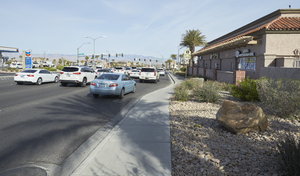
Commercial development along Eastern Avenue south of Horizon Ridge Parkway, looking west-northwest in Henderson, Nevada: digital photograph
Date
Archival Collection
Description
From the UNLV University Libraries Photographs of the Development of the Las Vegas Valley, Nevada (PH-00394). Part of the collection documents the entire 19 mile length of the north/south Eastern Avenue / Civic Center Drive alignment. This photograph was captured in the section of Eastern Avenue between Coronado Center Drive and Sunridge Heights Parkway.
Image
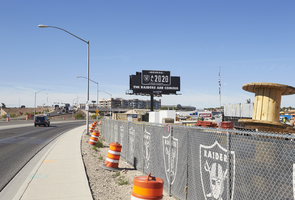
Raiders signage covers the fence surrounding the Allegiant Stadium construction site, looking south in Las Vegas, Nevada: digital photograph
Date
Archival Collection
Description
Photographed as part of the UNLV Special Collections and Archives' Building Las Vegas collecting initiative started in 2016. This photo is part of a series documenting ongoing construction work at the Allegiant Stadium.
Image
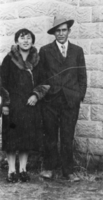
Mayme Hooper and her husband Albert Hooper in front of Stone House on their ranch in Monitor Valley, Nevada: photographic print
Date
Archival Collection
Description
From the Nye County, Nevada Photograph Collection (PH-00221) -- Series VI. Tonopah, Nevada -- Subseries VI.C. Hooper Family. The Hoopers lived in Stone House for 50 years; the building is a historic site and once served as a stage coach stop.
Image
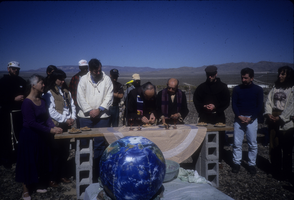
Louis Vitale, Dom Hélder Câmara, and numerous unidentified protestors at the Nevada Test Site: photographic slide
Date
Archival Collection
Description
From the Sister Klaryta Antoszewska Photograph Collection (PH-00352). Dom Hélder Câmara (fourth from the right) was the Archbishop of Brazil. Louis Vitale (fifth from the right) was a member of the Order of Friars Minor (O.F.M.). Lenten Desert Experience.
Image
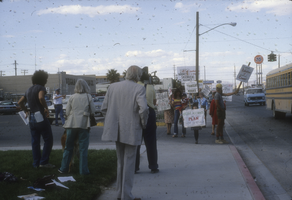
Protestors outside of U.S. Department of Energy Building: photographic slide
Date
Archival Collection
Description
From the Sister Klaryta Antoszewska Photograph Collection (PH-00352). One of the signs read, "NUCLEAR ACCIDENTS WE PLAN THEM IN NEVADA". Another one reads, "unplanned radiation = TRADGEDY planned radiation = MURDER". Another one reads, "planned Radiation = planned Cancer. Another reads, "AN ALLOWABLE LEVEL OF RADIATION IS AN ALLOWABLE LEVEL OF CANCER WHO DECIDES". Another one reads, "RADIATION AND CANCER GO HAND IN HAND". The other signs are not legible.
Image
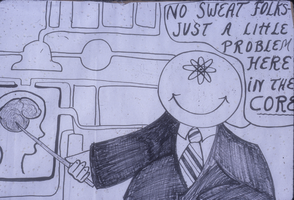
Artistic protest poster from an unidentified artist protesting outside of UNLV Moyer Student Union in Las Vegas, Nevada: photographic slide
Date
Archival Collection
Description
From the Sister Klaryta Antoszewska Photograph Collection (PH-00352). The protest poster reads, "No sweat folks, just a little problem here in the core."
Image
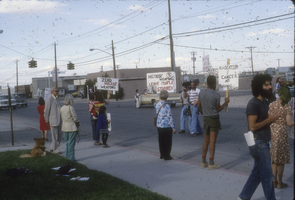
Unidentified protestors outside of UNLV Moyer Student Union in Las Vegas, Nevada: photographic slide
Date
Archival Collection
Description
From the Sister Klaryta Antoszewska Photograph Collection (PH-00352). The first protest sign on the left reads, "No nuclear weapons." The second protest sign reads, "Destroy weapons leave people standin'." The last protest sign on the right reads, "Radiation & Cancer are personal friends."
Image
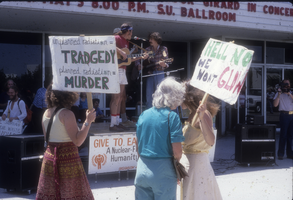
Unidentified protestors outside of UNLV Moyer Student Union in Las Vegas, Nevada: photographic slide
Date
Archival Collection
Description
From the Sister Klaryta Antoszewska Photograph Collection (PH-00352). A banner attached to a stage reads, "Give to Earth A Nuclear-Free Humanity. Sagebrush Alliance." The first protest sign on the left reads, "Unplanned radiation = tragedy. Planned radiation = murder." The second protest sign on the right reads, "Hell no we won't glow."
Image
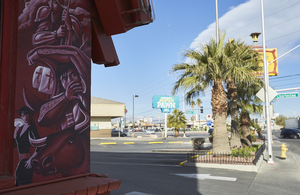
Mural work on the side of Pepe's Tacos on Fremont Street near Eastern Avenue, looking west in Las Vegas, Nevada: digital photograph
Date
Archival Collection
Description
From the UNLV University Libraries Photographs of the Development of the Las Vegas Valley, Nevada (PH-00394). Part of the collection documents the entire 19 mile length of the north/south Eastern Avenue / Civic Center Drive alignment. This photograph was captured in the section of Eastern Avenue between Stewart Avenue and Charleston Boulevard.
Image
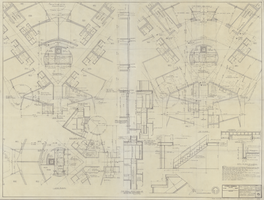
Architectural drawing of the Hacienda (Las Vegas), detailed plans, first, second, third floor, elevator lobbies, August 5, 1957
Date
Archival Collection
Description
Plans for the construction of a 266 room addition for the Hacienda. Inlcudes coffer and elevator hatchway details.
Site Name: Hacienda
Address: 3590 Las Vegas Boulevard South
Image
